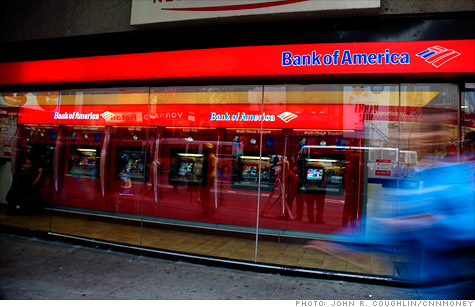Search News

Bank of America's recent stock slide has prompted talk about whether Washington now has the ability to take down a "too big to fail" bank.
WASHINGTON (CNNMoney) -- Washington leaders said "never again" to "too big to fail," vowing that the next time, they'd put a troubled big bank out of its misery.
But are they really ready for a big bank failure? Nobody knows.
This week's big stock dive in Bank of America -- which has balance sheets still loaded with the remains of the housing crisis -- has gotten Wall Street veterans thinking about what would happen if a big bank needed help from the government.
Shares of Bank of America (BAC, Fortune 500) , Citigroup (C, Fortune 500), Goldman Sachs (GS, Fortune 500) and Morgan Stanley (MS, Fortune 500) dropped more than 7% on Wednesday. They dropped by even more Monday, although there was a partial rebound the following day.
Bank of America got a bit of relief on Wednesday, with mortgage backer Fannie Mae agreeing to buy $500 million worth of servicing rights of some of the bank's bad mortgages. But Bank of America remains high on the watch list.
"I think the FDIC is ready, they've been getting ready for this for a while. The question is: Are Tim Geithner and Obama ready?" asked Christopher Whalen, a banking analyst with Institutional Risk Analytics. "Do we want this situation to muddle along? Or do we pre-empt and restructure?"
Banking analyst Richard Bove of Rochdale Securities told Fortune on Monday that such takeover rumors are "all baloney," since banks, including Bank of America, have far more liquidity and excess capital than they did in 2008.
Others acknowledge that a worst-case-scenario run on the banks could force regulators' hands on a failure, since traditional bailouts aren't a political option. Experts on the frontline of the 2008 financial crisis say they don't believe regulators are truly prepared.
"It's hard to imagine the agencies are ready for prime time in actually doing this," said Phil Swagel, a University of Maryland professor who was an assistant Treasury Secretary at the height of the last financial crisis. "They're not fully prepared for how difficult it would be to resolve a big bank."
Procedurally, the agencies have the powers to take down banks with more than $50 billion in assets. The Federal Deposit of Insurance Corp. has even finished up its priority list of who gets paid first, giving first dibs to the taxpayers, since Treasury would have to front so-called bridge loans to keep the lights on at the banks while the FDIC starts winding them down.
The agency is still working with the other regulators on a couple of big tools that aim to red-flag giant banks in trouble. Eventually they'll have a process for marking certain mega-banks that threaten the financial system. They'll also force these big banks to sketch out their own "living wills," or blueprints on dissolving. But those tools aren't ready yet.
"We currently have the legal authority to unwind a systemic firm," said FDIC spokesman Andrew Gray, adding the process was never intended to be ready-to-go when the new Dodd-Frank laws kicked in. "We've made significant progress and hope to have the living will rule in place in the next couple of months."
But even with speed bumps in place to ward off full-scale financial collapse, some economists, including Simon Johnson of the Massachusetts Institute of Technology, have publicly argued that the government's so-called resolution powers are a myth.
Johnson wrote in a March essay that they won't work in reality, because resolution powers can't cross international borders and unwind big banks' overseas businesses.
Former FDIC Chairman Sheila Bair has been the most public defender of resolution authority, saying it will work and that no bank is too big to fail.
Though she was unavailable to comment, under her watch, the FDIC issued a study earlier this year stating that their resolution powers could have taken down Lehman Brothers, and given bondholders and creditors more than they got in bankruptcy.
Few believe it. In an unscientific poll by the American Bankruptcy Institute on its website last month, 51% of those who voted said they didn't believe that creditors would have fared better in a government take-down of Lehman Brothers. Swagel says he agrees.
"The FDIC takes a 20% loss when they resolve a bank on the street corner," Swagel said. "It's preposterous to think that the FDIC could have avoided big losses on Lehman." ![]()
| Overnight Avg Rate | Latest | Change | Last Week |
|---|---|---|---|
| 30 yr fixed | 3.80% | 3.88% | |
| 15 yr fixed | 3.20% | 3.23% | |
| 5/1 ARM | 3.84% | 3.88% | |
| 30 yr refi | 3.82% | 3.93% | |
| 15 yr refi | 3.20% | 3.23% |
Today's featured rates:
| Latest Report | Next Update |
|---|---|
| Home prices | Aug 28 |
| Consumer confidence | Aug 28 |
| GDP | Aug 29 |
| Manufacturing (ISM) | Sept 4 |
| Jobs | Sept 7 |
| Inflation (CPI) | Sept 14 |
| Retail sales | Sept 14 |